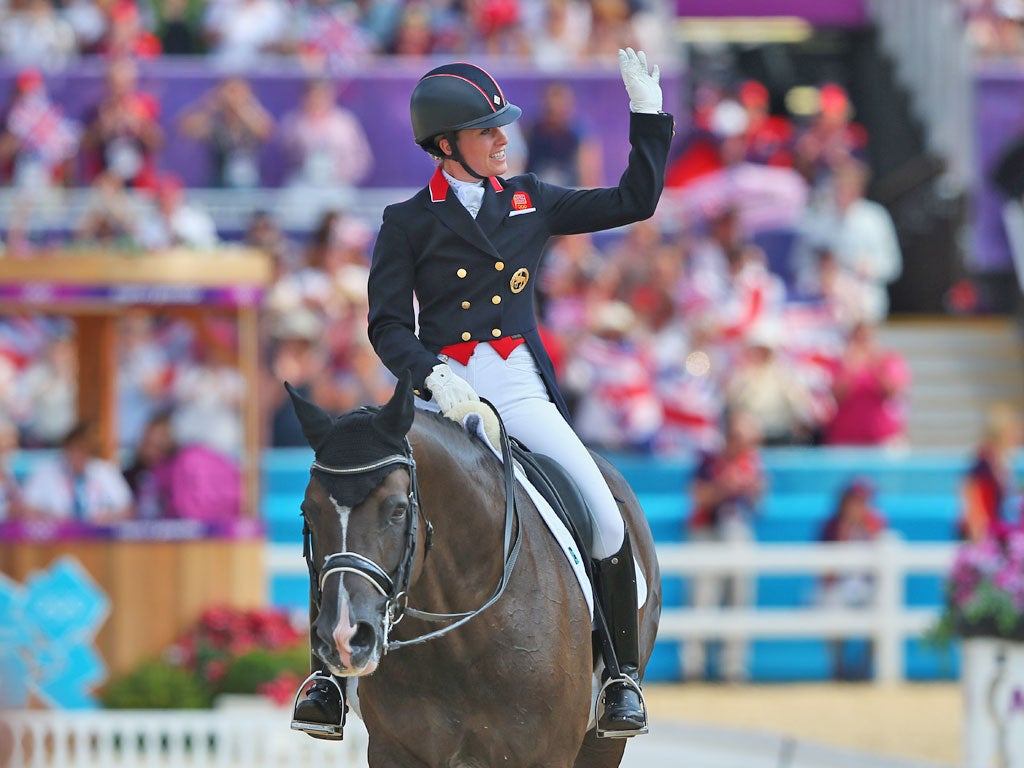Equestrian: 'Unlikely winner' Charlotte Dujardin celebrates double gold

Gold medallists can come from all sorts of backgrounds, but rarely has there been as unlikely a winner as Charlotte Dujardin, who became Britain’s first individual dressage Olympic champion amid joyous scenes at Greenwich Park today.
If the 26-year-old’s British colleague, Laura Bechtolsheimer, fitted the stereotype you might expect of competitors in this sport – the bronze medal winner is the grand-daughter of a property billionaire – Dujardin showed that determination and talent can bring their rewards.
Dujardin, who was also the outstanding performer when Britain won the gold in the team event 48 hours earlier, was educated at a comprehensive school in Bedfordshire and said that her parents had been able to buy her first dressage horse only when they inherited some money following the death of her grandmother. Dujardin competed in her first international dressage competition only last year.
“My parents don’t have a lot of money and it was only through that inheritance money that we were able to buy my first Grand Prix horse,” she said. “I started in a showing background. I was very lucky that we had ponies. We had to produce ponies, make them into something, because we never had the money for top ponies. Mum was very good at spotting a cheap one that was also a good one, I learned from that, so Mum taught me a lot.”
Dujardin has won her Olympic medals on Valegro, a horse owned by Carl Hester and Roly Luard. Hester, who finished fifth in the individual event, employs Dujardin at his yard in Gloucestershire. He initially allowed Dujardin to ride Valegro when he was a novice, with the intention of reclaiming the gelding when he had more experience, but horse and rider proved such a successful combination that they stayed together.
However, the likelihood now is that Valegro – who at 10 years old is young for a dressage horse - will be sold. Buying and selling competition horses is big business, with one of the German horses recently changing hands for more than £10m.
Yesterday’s triumphs completed a remarkable fortnight for Britain, who until last week had won only one Olympic equestrian gold medal since 1972. Until this week Britain had never won an Olympic medal of any colour in dressage.
In these Games, however, the home team have won three gold medals (in team showjumping and dressage, plus Dujardin’s individual success), one silver (in the team three-day event) and one bronze (Bechtolsheimer in individual dressage). Dujardin, meanwhile, joins Kelly Holmes, Rebecca Adlington and Laura Trott as the only British women to win two gold medals at a single Games.
Having helped to end 28 years of German domination in the team event, Dujardin went on to triumph in a competition in which the Dutch normally excel. Whereas the team event is decided by a series of set tests which all riders have to perform, the individual freestyle event allows much more freedom of expression.
Riders choose their own music and can decide on the difficulty of their routines. Marks are awarded by seven judges – whose scores are added together to give a percentage score – and are given both for technical excellence and artistic interpretation.
The Dutch rider Anky van Grunsven had won the last three Olympic individual gold medals, but this time she could finish only sixth. It was left to her compatriot, Adelinde Cornelissen, to mount the strongest challenge. Bechtolsheimer was in the gold medal position until Cornelissen, the penultimate rider, delivered a technically brilliant performance to move into the lead
The music chosen by earlier riders had ranged from from Tchaikovsky’s “Swan Lake” to Phil Collins’ “Dance into the Light” and the Black Eyed Peas’ “Mas Que Nada”, while Dujardin, the last to perfom, chose chose a medley of popular tunes from film soundtracks, including “The Great Escape” and “Live and Let Die”, and, to finish, Edward Elgar’s “Pomp and Circumstance”.
It was a thoroughly entertaining routine, spoiled only by a mistake near the end as Valegro made a small jump into the air in the transition between the passage and piaffe sections. The judges, nevertheless, awarded her 90.089 per cent, which was nearly two per cent higher than Cornelissen’s score. It was an Olympic record and only the third score in history over 90 per cent.
Stephen Clarke, the president of the judges’ jury, said afterwards: “We felt that Charlotte’s performance had a softer touch. Adelinde gave a very powerful display, but Charlotte had better harmony and self-carriage, and these were the qualities we decided to go on.”
Maarten van der Heijden, the Dutch team leader and performance director, said afterwards: “I thought we deserved the gold. Adelinde could not have performed better. She did an incredible test. After Valegro made those two mistakes at the end we thought we had won the gold.”
Why did he think Dujardin had won? “Maybe the judges thought Valegro’s performance was softer and lighter,” he said. “And we are in England.”
Dujardin admitted: “I suppose with that slight mistake, it was ‘The Great Escape’ in the end. I sat down and made a point of watching the film after I chose the music and will probably sit down and watch it again one evening with a glass of something.”
Subscribe to Independent Premium to bookmark this article
Want to bookmark your favourite articles and stories to read or reference later? Start your Independent Premium subscription today.

Join our commenting forum
Join thought-provoking conversations, follow other Independent readers and see their replies